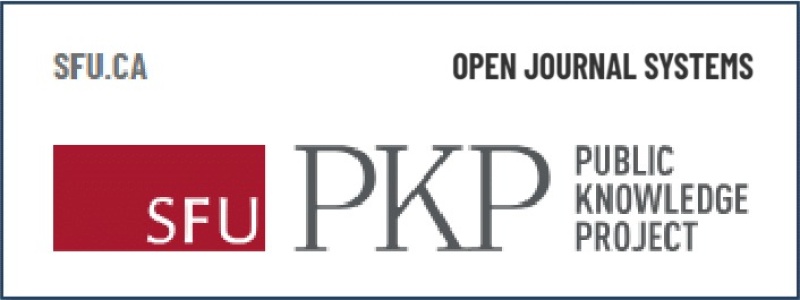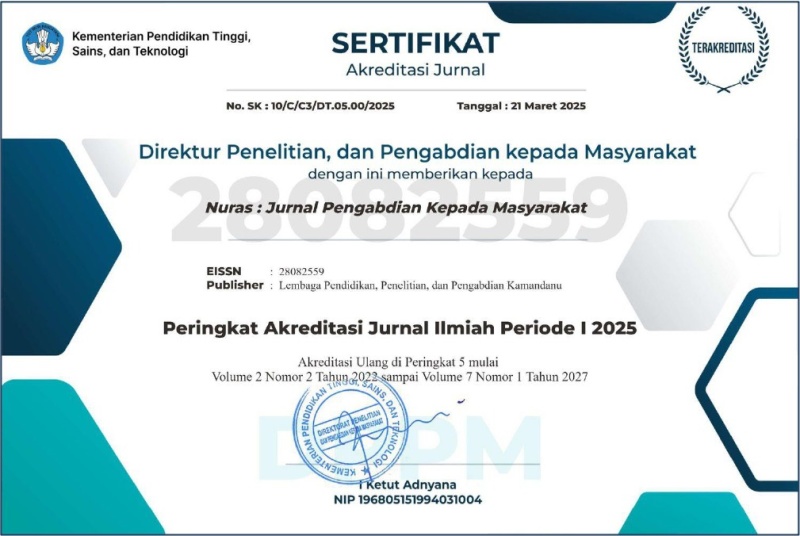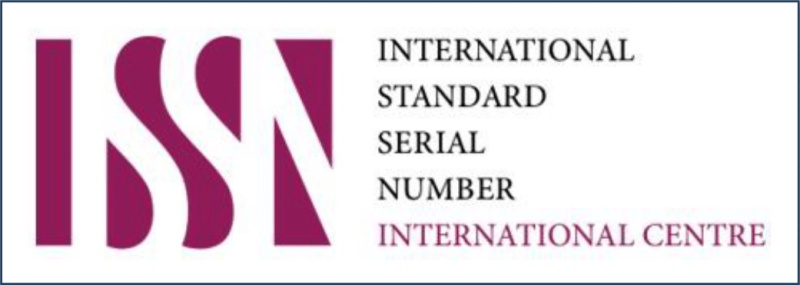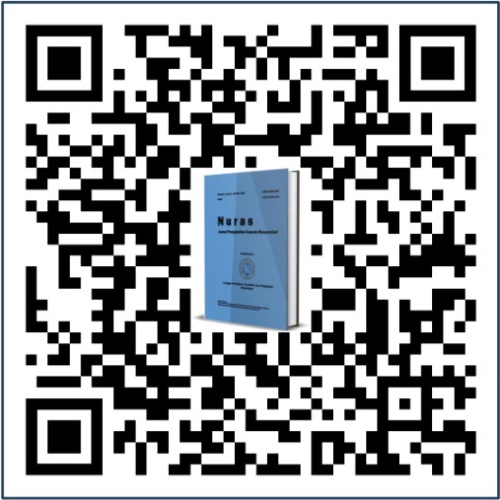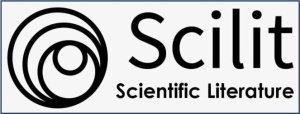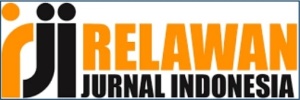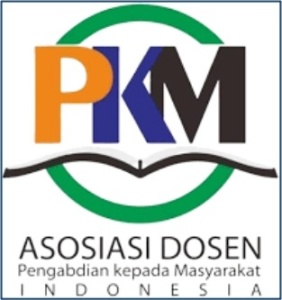Intervensi KKN-T untuk Pencegahan Stunting melalui Edukasi Gizi dan Ketahanan Pangan Lokal
DOI:
https://doi.org/10.36312/nuras.v5i4.735Keywords:
Food Security, KKN-T, Nutrition Literacy, Community Empowerment, StuntingAbstract
Stunting remains a chronic nutritional problem that hinders human development in Indonesia due to its multidimensional impacts on cognitive aspects, economic productivity, and the social well-being of communities. To address this challenge, the Thematic Community Service program (KKN-T) of Alma Ata University in Debong Kulon Village was developed through a synergistic three-pillar model that integrates family nutrition education, literacy and utilization of local food, as well as household economic empowerment based on nutrition gardens as a holistic strategy to combat stunting. This program employs a community-based participatory approach through four systematic stages, problem identification, participatory planning, intervention implementation, and reflective evaluation, to ensure the program’s relevance and sustainability. Empirical results show a 23.5% increase in family nutrition knowledge, an 87% rise in participation in community health posts (posyandu), and 82% of households successfully managing nutrition gardens independently. Scientifically, these findings affirm the effectiveness of participatory communication, social learning, and local food self-sufficiency in fostering sustainable nutritional behavior change. The main conclusion indicates that the triple-pillar empowerment model has proven effective in strengthening social resilience and ensuring the sustainability of interventions, while also offering an adaptive replication model for urban and semi-urban areas within the framework of equitable and sustainable community development.
Downloads
References
Aditya, R. B., & Zakiah, A. (2022). Practical Reflection and Benefits of Making a Food Garden at Home During Covid-19 Pandemic. International Journal of Food Studies, 11(1), 85-97. https://doi.org/10.7455/ijfs/11.1.2022.a8
Afandi, A., Laily, N., Wahyudi, N., Umam, M. H., Kambau, R. A., Rahman, S. A., Sudirman, M., Jamilah, J., Kadir, N. A., Junaid, S., Nur, S., Dwi, R., Parmitasari, A., Nurdiyanah, N., Wahid, M., & Wahyudi, J. (2022). Metodologi Pengabdian Masyarakat. Jakarta: Direktorat Pendidikan Tinggi Keagamaan Islam, Ditjen Pendidikan Islam, Kementerian Agama Republik Indonesia.
Alisjahbana, A. S., & Murniningtyas, E. (2018). Tujuan Pembangunan Berkelanjutan di Indonesia. Bandung: Unpad Press.
Asmolov, G. (2019). The Effects of Participatory Propaganda: from Socialization to Internalization of Conflicts. Journal of Design and Science, 6(1), 1-22. https://doi.org/10.21428/7808da6b.833c9940
Badan Kependudukan dan Keluarga Berencana Nasional (BKKBN). (2021). Kebijakan dan Strategi Percepatan Penurunan Stunting di Indonesia. Jaakarta: Badan Kependudukan dan Keluarga Berencana Nasional (BKKBN).
Berkes, F., & Ross, H. (2016). Panarchy and Community Resilience: Sustainability Science and Policy Implications. Environmental Science & Policy, 61(1), 185-193. https://doi.org/10.1016/j.envsci.2016.04.004
Bertram, T., & Pascal, C. (2016). Early Childhood Policies and Systems in Eight Countries: Findings from IEA’s Early Childhood Education Study. Amsterdam: International Association for the Evaluation of Educational Achievement (IEA).
Choiriyah, C., Widiati, D. P., & Emiliana, W. (2023). The Role of Literacy in Increasing Children’s Reading Interest in Early Childhood. Indonesian Journal of Early Childhood Education Studies, 12(2), 191-203. https://doi.org/10.15294/ijeces.v12i2.73749
Chourio-Acevedo, L., & Gonzalez-Ibariez, R. (2024). Evaluation of Online Inquiry Competencies of Chilean Elementary School Students: A Dataset. Data, 9(7), 1-13. https://doi.org/10.3390/data9070085
Christens, B. D. (2019). Community Power and Empowerment. Oxford: Oxford University Press.
Chu, K. M., & Chan, H. -C. (2019). Community Based Innovation: Its Antecedents and Its Impact on Innovation Success. Internet Research, 19(5), 496-516. https://doi.org/10.1108/10662240910998887
Corti, F., & Alcidi, C. (2023). How Can Early Childhood Education and Care Policies Empower Citizen?. Brussels: Centre for European Policy Studies (CEPS).
Dewayani, S., Retnaningdyah, P., Susanto, D., Ikhwanuddin, T., Fianto, F., Muldian, W., Syukur, Y., Setiakarnawijaya, Y., & Antoro, B. (2021). Panduan Penguatan Literasi dan Numerasi di Sekolah. Jakarta: Direktorat Jenderal PAUD, Dikdas, dan Dikmen, Kementerian Pendidikan dan Kebudayaan Republik Indonesia.
Dinas Kesehatan Kota Tegal. (2024). Laporan Kinerja Pemerintahan (LAKIP) Dinas Kesehatan Kota Tegal, Jawa Tengah. Tegal: Dinas Kesehatan Kota Tegal.
Fitri, J. R., Huljanah, N., & Rochmah, T. N. (2022). Stunting Prevention Program in Indonesia: A Systematic Review. Media Gizi Indonesia, 7(3), 281-292. https://doi.org/10.20473/mgi.v17i3.281-292
Gelderblom, D. (2018). The Limits to Bridging Social Capital: Power, Social Context and the Theory of Robert Putnam. The Sociological Review, 66(6), 1-20. https://doi.org/10.1177/0038026118765360
Haldane, V., Chuah, F. L., Srivastava, A., Singh, S. R., Koh, G. C., & Seng, C. K. (2019). Community Participation in Health Services Development, Implementation, and Evaluation: A Systematic Review of Empowerment, Health, Community, and Process Outcomes. PLoS One, 14(5), 1-25. https://doi.org/10.1371/journal.pone.0216112
Hatcher, R., & Campbell, R. (2024). Literature Review: The Impact of AI-Personalized Tutors on Academic Ability, Self-Esteem, Self-Efficacy, Socialization, and Academic Integrity. ISAR Journal of Arts, Humanities and Social Sciences, 2(2), 72-78.
Holmes, W., Porayska-Pomsta, K., Holstein, K., Sutherland, E., Baker, T., Shum, S. B., Santos, O. C., Rodrigo, M. T., Cukurova, M., Bittencourt, I. I., & Koedinger, K. R. (2022). Ethics of AI in Education: Towards a Community-Wide Framework. International Journal of Artificial Intelligence in Education, 32(1), 504-526. https://doi.org/10.1007/s40593-021-00239-1
Hou, C. -H. (2024). Sustainable and Collaborative Health Promotion in Urban Communities: Practical Implementation and Outcomes Based on Community Capital. Sustainability, 16(20), 1-10. https://doi.org/10.3390/su16209112
International Bank for Reconstruction and Development. (2021). Melangkah Maju: Inisiatif Lokal dalam Menurunkan Stunting di Indonesia. Washington D. C.: International Bank for Reconstruction and Development/The World Bank.
Jouany, V. (2023). Retrieved October 25, 2025, from Haiilo. Interactwebsite: https://www.haiilo.com/blog/employee-empowerment-in-the-workplace/
Juarez, M., Dionicio, C., Sacuj, N., Lopez, W., Miller, A. C., & Rohloff, P. (2021). Community-Based Interventions to Reduce Child Stunting in Rural Guatemala: A Quality Improvement Model. Ijerph, 18(2), 1-13. https://doi.org/10.3390/ijerph18020773
Kapadia, R., Nurbani, N., & Agustina, M. (2022). Pengaruh Participatory Learning Approach (PLA) terhadap Pengetahuan dan Kesadaran Ibu dalam Pencegahan Stunting. Bima Nursing Journal, 3(2), 109-117. https://doi.org/10.32807/bnj.v3i2.873
Korppelainen, H. (2023). The Role of Home Gardens in Promoting Biodiversity and Food Security. Plants, 12(13), 1-11. https://doi.org/10.3390/plants12132473
Lestari, T. R. P. (2025). Evaluation of Policies and Strategies for Reducing Stunting in 2024. Aspirasi: Jurnal Masalah-masalah Sosial, 16(1), 71-86. https://doi.org/10.46807/aspirasi.v16i1.4800
Miles, M. B., Huberman, A. M., & Saldana, J. (2013). Qualitative Data Analysis: A Methods Sourcebook. California: Sage Publications.
Mpanje, D., Gibbons, P., & McDermott, R. (2018). Social Capital in Vulnerable Urban Settings: An Analytical Framework. Journal of International Humanitarian Action, 3(4), 1-14. https://doi.org/10.1186/s41018-018-0032-9
Nazidah, M. D. P., Fauziah, R., Hafidah, R., Jumiatmoko, J., & Nurjanah, N. E. (2022). Pengaruh Stunting pada Kognitif Anak Usia Dini. Yinyang: Jurnal Studi Islam, Gender dan Anak, 17(1), 59-71. https://doi.org/10.24090/yinyang.v17i1.4964
Nur, M. (2022). Pengantar Metodologi Pengabdian Masyarakat. Banjarmasin: Yayasan Penerbit Muhammad Zaini.
Olcese, M., Cardinali, P., Madera, F., Camilleri, A. P., & Migliorini, L. (2024). Migration and Community Resilience: A Scoping Review. International Journal of Intercultural Relations, 98(1), 1-15. https://doi.org/10.1016/j.ijintrel.2023.101924
Pradnyawati, L. G., Juwita, D. A. P. R., Kartinawati, K. T., Wijaya, M. I., & Prabandari, A. A. S. M. (2023). Overview of the First 1000 Days of Life and Stunting in Toddlers 0-2 Years Old in Tegallalang District, Bali Province. Journal of International Surgery and Clinical Medicine, 3(1), 11-15. https://doi.org/10.51559/jiscm.v3i1.41
Radjak, D. A., Ra’is, D. U., & Rohman, A. (2024). Pembangunan Masyarakat Desa. Malang: Penerbit Forind.
Rao, N., Umayahara, M., Yang, Y., & Ranganathan, N. (2021). Ensuring Access, Equity and Quality in Early Childhood Education in Bangladesh, China, India and Myanmar: Challenges for Nations in a Populous Economic Corridor. International Journal of Educational Development, 82(1), 1-10. https://doi.org/10.1016/j.ijedudev.2021.102380
Rochaendi, E., Ariyani, Y. D., Sari, I. P., Mahfud, M., Kholik, N., Rouzi, K. S., Afifah, N., & Nazibi, Z. (2024). Pelaksanaan KKN-Tematik: Mengoptimalisasi Disseminasi Pembangunan Perdesaan dan Pemberdayaan Masyarakat. Berdaya: Jurnal Pendidikan dan Pengabdian kepada Masyarakat, 6(1), 75-92. https://doi.org/10.36407/berdaya.v6i1.1003
Rochaendi, E., Rouzi, K. S., Dwinta, E., Kholik, N., Sari, I. P., Mahfud, M., & Ismiati, B. (2024). Community Empowerment through PPK Ormawa to Strengthen Interest in Reading Rural Communities. To Maega: Jurnal Pengabdian Masyarakat, 7(1), 475-486. https://doi.org/10.35914/tomaega.v7i3.2711
Ruel, M. T., Quisumbing, A. R., & Balagamwala, M. (2018). Nutrition-Sensitive Agriculture: What Have We Learned So Far?. Global Food Security, 17(1) 128-153. https://doi.org/10.1016/j.gfs.2018.01.002
Safnowandi, S. (2024). Implementasi Pola Hidup Sehat Berbasis Keluarga. Nuras : Jurnal Pengabdian Kepada Masyarakat, 4(4), 165-169. https://doi.org/10.36312/nuras.v4i4.322
Sekretariat Negara Republik Indonesia. (2020). Retrieved October 25, 2025, from Kementerian Sekretariat Negara Republik Indonesia. Interactwebsite: https://www.setneg.go.id/
Setiawan, P., & Indrianingsih, R. S. (2020). Innovation Based Community Empowerment Program. International Journal of Research in Community Service, 1(4), 51-55. https://doi.org/10.46336/ijrcs.v1i4.298
UNICEF. (2023). Early Childhood Development: UNICEF Vision for Every Child. New York: UNICEF.
Yuliandari, N., & Suryana, D. (2022). The Role of Parents in Early Childhood’s Emotional Social Development. Cakrawala Dini: Jurnal Pendidikan Anak Usia Dini, 13(1), 41-48. https://doi.org/10.17509/cd.v13i1.41299
Downloads
Published
How to Cite
Issue
Section
License
Copyright (c) 2025 Endi Rochaendi, Yusinta Dwi Ariyani, Ismanto, Indah Perdana Sari, An Nisa Apriani, Ruwet Rusiyono, Suryandari, & Elvara Norma Aroyandini

This work is licensed under a Creative Commons Attribution-ShareAlike 4.0 International License.
-
Attribution — You must give appropriate credit, provide a link to the license, and indicate if changes were made. You may do so in any reasonable manner, but not in any way that suggests the licensor endorses you or your use.
-
ShareAlike — If you remix, transform, or build upon the material, you must distribute your contributions under the same license as the original.


